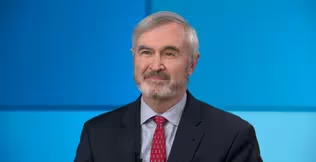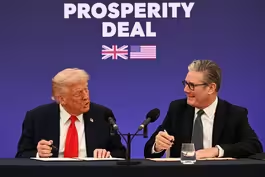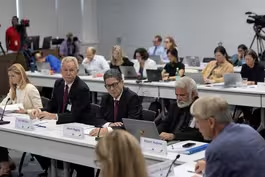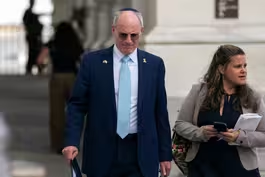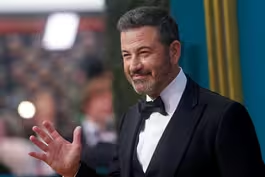
Senate Republicans change rules to approve Trump nominees
Clip: 9/18/2025 | 3m 59sVideo has Closed Captions
Senate Republicans change rules to push through Trump nominees
One of the largest groups of President Trump’s nominees was just confirmed in the U.S. Senate. The group includes 48 individuals who would hold significant jobs in the military, national security and overseas. The move was possible only because Republicans changed the rules of the Senate to get more nominees through, more quickly. Congressional correspondent Lisa Desjardins reports.
Problems playing video? | Closed Captioning Feedback
Problems playing video? | Closed Captioning Feedback
Major corporate funding for the PBS News Hour is provided by BDO, BNSF, Consumer Cellular, American Cruise Lines, and Raymond James. Funding for the PBS NewsHour Weekend is provided by...

Senate Republicans change rules to approve Trump nominees
Clip: 9/18/2025 | 3m 59sVideo has Closed Captions
One of the largest groups of President Trump’s nominees was just confirmed in the U.S. Senate. The group includes 48 individuals who would hold significant jobs in the military, national security and overseas. The move was possible only because Republicans changed the rules of the Senate to get more nominees through, more quickly. Congressional correspondent Lisa Desjardins reports.
Problems playing video? | Closed Captioning Feedback
How to Watch PBS News Hour
PBS News Hour is available to stream on pbs.org and the free PBS App, available on iPhone, Apple TV, Android TV, Android smartphones, Amazon Fire TV, Amazon Fire Tablet, Roku, Samsung Smart TV, and Vizio.
Providing Support for PBS.org
Learn Moreabout PBS online sponsorshipWILLIAM BRANGHAM: One of the largest groups of President Trump's nominees was confirmed in the U.S.
Senate today, 48 individuals who will hold significant jobs in the military, national security and overseas.
That is possible only because Republicans changed the rules of the Senate last week.
Some on Capitol Hill call it going nuclear to get more nominees through more quickly.
Our congressional correspondent, Lisa Desjardins, is here to explain what this all means.
Lisa, as you have taught us, the Senate lives and dies by process.
So what exactly changed here and what does this mean for the Trump administration?
LISA DESJARDINS: What Senate Republicans did is they changed the rules so that they could pass nominees in large groups.
Until now, they needed the approval of everyone in the chamber to be able to do that.
Now, that may not sound like a big deal, but it is a very big deal when you have 1,300 filled -- positions that need to be filled by the Trump administration.
And Senate Democrats have done something unique this time around.
They have slow-rolled every single one of those nominations.
So it has really bogged down the Senate.
President Trump has made threats about other ways he would try to get his nominations through.
Senator Thune, the lead Republican, didn't want to go that way.
So they decided to change the rules here, which also has its partisan risks with it.
Now, this has led to them passing that through last night.
And I want to talk about exactly who these first -- or -- sorry - - today, they passed the nominations.
Who was in that group of 48?
Let's take a look at what kind of positions we're talking about.
There, you see Kimberly Guilfoyle and Newt Gingrich's, Callista.
They are ambassadors.
They have been approved today.
They were waiting for several weeks for that approval.
You see a couple of positions for national security, including the director of the National Counterintelligence and Security Center.
Then you see an assistant secretary for the Air Force and the administrator of the National Highway Traffic Safety Administration.
So these are important positions.
And what's important about the way Republicans did this is, they can apply this group mentality to almost any group nominee, outside of judges, except for Cabinet secretary.
So take all those 1,300 positions.
Technically, they could pass almost all of them except for 20 using this method.
WILLIAM BRANGHAM: I think you have sort of answered this already, but in terms of how our government operates, how big a sea change is this?
LISA DESJARDINS: It depends on whom you ask.
I think it is significant.
But, of course, I'm a creature of the Senate.
Some people would say that the Senate is broken.
And I think almost everyone would agree that it's broken.
The Senate now, outside of the Trump era, has now gotten in a situation where it finds itself spending maybe half of its time on nominations, not doing other business and legislating.
But there are others who would say that this change is not what's needed to fix it, that this goes way too far.
And, indeed, everyone would also agree that this is giving tremendous power to the executive and to the governing party if the president shares the same party as the Senate.
We talked to Max Stier, who studies this with the Partnership for Public Service.
MAX STIER, President and CEO, Partnership for Public Service: I think it's unquestionable that the Senate confirmation process is broken and it creates a lot of dysfunction across the entire federal government.
But it's the equivalent of having some dandelions in your lawn and tearing up the whole thing.
Better to pluck out the dandelions than to lose the lawn entirely.
And that's what we're watching right now with the Senate confirmation process.
LISA DESJARDINS: The question is how large of groups of nominees do they have?
Because it's harder for us to actually hold accountable and look into these groups of nominees if they're coming in large groups.
WILLIAM BRANGHAM: And what does this mean for the filibuster?
Can we draw any conclusions about that?
LISA DESJARDINS: I don't think not yet.
It's still a third rail, and Republicans know that, once they're out of office, then the Democrats could use it as well, much as you were talking to Dylan Byers about.
WILLIAM BRANGHAM: Lisa Desjardins, thank you so much.
LISA DESJARDINS: You're welcome.
How debt interest is becoming a problem for the government
Video has Closed Captions
Clip: 9/18/2025 | 7m 41s | How debt interest is becoming a bigger problem for the U.S. government (7m 41s)
John Malcolm on an originalist analysis of the Constitution
Video has Closed Captions
Clip: 9/18/2025 | 8m 28s | Heritage Foundation's John Malcolm on its new originalist analysis of the Constitution (8m 28s)
News Wrap: Trump wraps up state visit to the UK
Video has Closed Captions
Clip: 9/18/2025 | 6m | News Wrap: Trump wraps up state visit to the UK (6m)
Panel overhauled by RFK Jr. changes vaccine recommendations
Video has Closed Captions
Clip: 9/18/2025 | 7m 3s | CDC panel overhauled by RFK Jr. changes childhood vaccine recommendations (7m 3s)
War ends when Gaza is free of Hamas, Israeli ambassador says
Video has Closed Captions
Clip: 9/18/2025 | 7m 58s | Israeli ambassador to U.S. says war ends when Gaza is 'free of Hamas' (7m 58s)
What Kimmel's suspension says about free speech under Trump
Video has Closed Captions
Clip: 9/18/2025 | 10m 23s | What the move to pull Kimmel off the air says about free speech under Trump (10m 23s)
Providing Support for PBS.org
Learn Moreabout PBS online sponsorship
- News and Public Affairs

FRONTLINE is investigative journalism that questions, explains and changes our world.

- News and Public Affairs

Amanpour and Company features conversations with leaders and decision makers.












Support for PBS provided by:
Major corporate funding for the PBS News Hour is provided by BDO, BNSF, Consumer Cellular, American Cruise Lines, and Raymond James. Funding for the PBS NewsHour Weekend is provided by...

